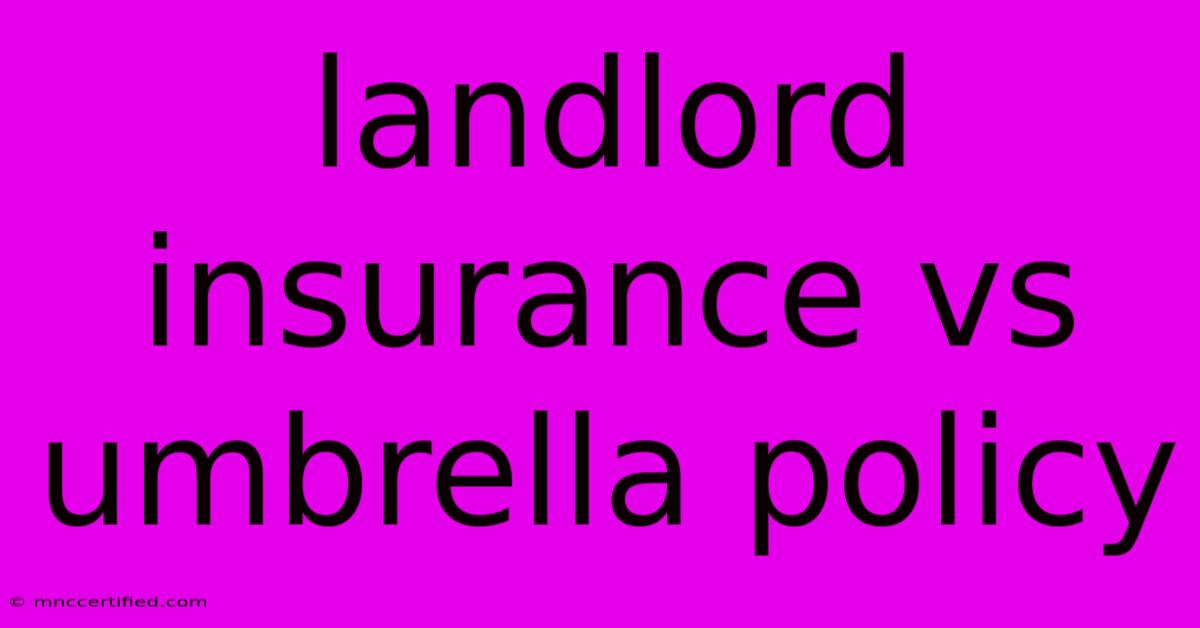Landlord Insurance Vs Umbrella Policy

Table of Contents
Landlord Insurance vs. Umbrella Policy: Which One Do You Need?
Being a landlord comes with a unique set of responsibilities and risks. While you might have homeowner's insurance for your own property, you'll need additional coverage to protect yourself financially from potential liabilities and unforeseen events related to your rental properties.
Two types of insurance commonly discussed in this context are landlord insurance and umbrella insurance. But how do they differ? Which one do you need? Let's dive into the details to help you make an informed decision.
Landlord Insurance: Your Rental Property's Shield
Landlord insurance is specifically designed to cover risks associated with owning and managing rental properties. It typically includes:
1. Property Coverage: This protects your building's structure against damage from fire, storms, vandalism, and other covered perils.
2. Liability Coverage: This safeguards you against lawsuits filed by tenants due to injuries on the property or other incidents.
3. Loss of Rental Income: If your property becomes uninhabitable due to a covered event, this coverage provides financial assistance while repairs are underway.
4. Personal Property Coverage: This can cover your own belongings, like appliances, furniture, or tools, stored on the property.
5. Additional Coverage: Some landlord policies also include features like tenant liability insurance to protect you from claims arising from your tenants' actions, vacancy coverage for periods when the property isn't rented, and legal defense costs in case of a lawsuit.
Umbrella Insurance: An Extra Layer of Protection
An umbrella policy is designed to provide additional liability coverage beyond the limits of your existing insurance policies, including your landlord insurance. Think of it as an "extra shield" for your assets.
Why an Umbrella Policy is Useful for Landlords:
- Higher Coverage Limits: Umbrella policies offer significantly higher liability limits (often millions of dollars) than standard landlord policies. This is crucial for situations involving serious accidents, injuries, or lawsuits that could deplete your assets.
- Broader Coverage: Umbrella policies can cover liabilities not covered by your landlord or other insurance policies, including personal liability and certain types of professional liability.
- Cost-Effective Protection: The premiums for umbrella policies are typically relatively affordable, especially when you consider the substantial financial protection they offer.
Which One Do You Need?
Ultimately, the decision of whether to get landlord insurance or an umbrella policy depends on your individual circumstances and risk tolerance.
Consider these factors:
- Number of Rental Properties: If you own multiple properties, landlord insurance and an umbrella policy are both essential.
- Value of Your Assets: The more valuable your assets are, the more important it becomes to have adequate liability coverage, which an umbrella policy can provide.
- Potential Liabilities: If your rental properties are in high-risk areas or you expect a higher potential for liability claims, an umbrella policy can offer peace of mind.
Here's a general rule of thumb:
- Landlord Insurance: Essential for any landlord.
- Umbrella Insurance: Highly recommended for landlords with multiple properties, significant assets, or high-risk situations.
Don't Be Left Unprotected!
Contact your insurance agent or broker to discuss your specific needs and determine the best combination of landlord insurance and umbrella coverage to protect your investments and your financial well-being.

Thank you for visiting our website wich cover about Landlord Insurance Vs Umbrella Policy. We hope the information provided has been useful to you. Feel free to contact us if you have any questions or need further assistance. See you next time and dont miss to bookmark.
Featured Posts
-
Premier League Brighton 0 4 Man City Stats
Nov 10, 2024
-
Td Auto Insurance Cancellation Policy
Nov 10, 2024
-
0 Beneficiary Insured Due To Age Oasi
Nov 10, 2024
-
West Ham Held By Everton In Goalless Draw
Nov 10, 2024
-
Clemson Star Out For Virginia Tech Game
Nov 10, 2024